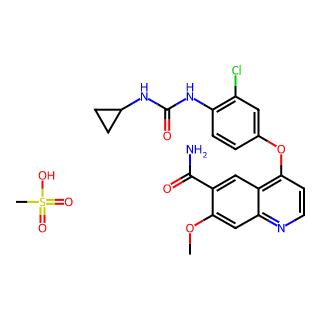- Synthetic anti-infective drugs
- Medications for the digestive system
- Antipyretic and analgesic drugs
- Medications for the blood system
- Medications for the respiratory system
- Anti-allergic drugs
- Medications for the urinary system
- Diagnostic medications
- Immunosuppressive and immunomodulatory drugs
- Vitamins and mineral supplements
- Antioxidants and medications for osteoporosis
- Antiparasitic drugs
- Ophthalmic medications
- Amino acids and their derivatives
- Dermatological medications
- Medications for the circulatory system
- Antitumor drugs
- Medications for the nervous system
- Hormonal and endocrine function-regulating drugs
- Antibiotics
- Others
CAS Number: 857890-39-2




I. Basic Information
Product Name: Lenvatinib Mesylate
CAS Number: 857890-39-2
Molecular Formula: C22H23ClN4O7S
Molecular Weight: 522.959
English Name: Lenvatinib Mesylate
Other Names: Mesylate of Lenvatinib, Lenvatinib Mesylate Salt, etc.
II. Physical Properties
Appearance: White to off-white powder
Melting Point: >220°C (dec.)
Solubility: Slightly soluble in DMSO and methanol
Storage Conditions: Typically recommended to store at 2-8°C, protected from light and kept dry. Some sources also mention room temperature storage with light protection.
III. Biochemical Mechanism and Biological Activity
Mechanism of Action: Lenvatinib Mesylate is an orally administered multi-target tyrosine kinase inhibitor that inhibits VEGFR1-3, FGFR1-4, PDGFR, KIT, and RET, demonstrating effective anticancer activity.
In Vitro Studies: IC50 values for VEGFR2(KDR), VEGFR3(Flt-4), and VEGFR1/Flt-1 are 4 nM, 5.2 nM, and 22 nM, respectively. Additionally, Lenvatinib inhibits PDGFRα, PDGFRβ, FGFR1, and KIT with IC50 values of 51 nM, 39 nM, 46 nM, and 100 nM, respectively.
In Vivo Studies: In animal models, Lenvatinib Mesylate inhibits tumor growth in a dose-dependent manner and causes tumor regression at high doses. Compared to anti-VEGF antibodies and imatinib, Lenvatinib reduces microvascular density.
IV. Uses and Precautions
Uses: Lenvatinib Mesylate is primarily used for scientific research or regulatory submissions, such as in the development of anticancer drugs and the study of protein tyrosine kinase signaling pathways. It is not intended for human use.
Precautions: When handling Lenvatinib Mesylate, follow relevant safety procedures to avoid direct contact with skin, eyes, etc. Store and transport at low temperatures, protected from light, and prevent moisture.

Tai Yau Street, San Po Kong, Kowloon, Hong Kong, China.



